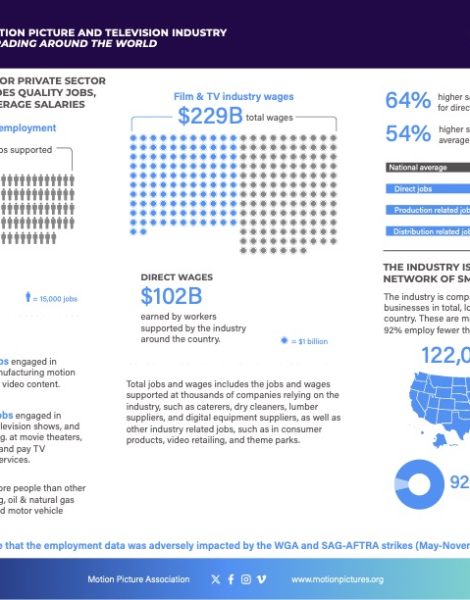The American Motion Picture and Television Industry: Creating Jobs, Trading Around the World
The American film and television industry supports 2.32 million jobs, pays out $229 billion in total wages, and comprises more than 122,000 businesses—according to an analysis of the most recent economic figures released by the Motion Picture Association.
For a more detailed analysis of the industry’s economic impact, download the full report:

American Parents’ Views on Movie Ratings
American parents overwhelmingly believe the Motion Picture Association’s film ratings are accurate and that they help them make better movie choices for their families, according to a new report released by our Classification and Rating Administration (which administers the rating system).
The survey of American parents’ views on movie ratings was conducted by PSB Insights, a global research and analytics consultancy. The research focuses on parents’ perceptions, attitudes, and expectations regarding movie content and the film rating system. PSB surveyed 1,500 parents of children aged 5-16, where both parent and child have watched a movie within the last six months either in a theater or in their home.

MPA Statement to the House Judiciary Committee IP Subcommittee Regarding Artificial Intelligence and Intellectual Property
For over a century, the studios represented by the Motion Picture Association, Inc. (“MPA”) have employed innovative new technologies to tell compelling stories to audiences here in the U.S. and around the globe. From the introduction of recorded sound in the 1920s and color in the 1930s, to the dazzling special effects of 2001: A Space Odyssey, Star Wars, Jurassic Park, Avatar, and The Curious Case of Benjamin Button, the MPA’s members have long used technology to allow filmmakers to bring their vision to the screen in the most compelling way possible.
Artificial intelligence is the latest technological innovation that has captured the attention of the world. Advancements in AI will likely lead to dramatic advancements in myriad industries from medicine to motion pictures. But with these developments also come significant concerns about potential misuses, including to create non-consensual pornographic deepfakes or spread disinformation about elections or national security matters, or otherwise deceive the public. MPA sees great promise in AI as a way to enhance the filmmaking process and provide an even more compelling experience for audiences. But we also share the concerns of actors and recording artists about how AI can facilitate the unauthorized replication of their likenesses and voices to supplant performances by them, which could potentially undermine their ability to earn a living practicing their craft.
Congress is now considering whether to legislate a new federal right to bar the unauthorized replication of individuals’ (including actors’ and recording artists’) likenesses and voices. MPA agrees that legislation to address these concerns may be warranted. However, in drafting any such bill, Congress must recognize that it would be doing something that the First Amendment sharply limits: regulating speech. Enacting new legislation to address specific harms from the misuse of digital replicas likely can be done consistent with the First Amendment. But it will take very careful drafting to accomplish the goal of addressing these harms without inadvertently chilling legitimate, constitutionally protected uses of technologies to enhance storytelling in our industry, along with other creative endeavors.
This statement will summarize the vital First Amendment issues implicated by a potential federal statute creating a “digital replica” right, emphasizing that creation of such a law would constitute a content-based regulation of speech, subjecting it to strict scrutiny, which requires both the existence of a compelling state interest to justify the regulation and narrow tailoring to serve that interest. MPA stands ready to work with Congress to ensure that any new legislation governing voices or likenesses respects First Amendment rights and creative freedoms, including those of filmmakers, broadcasters, photographers, journalists, and others who employ technologies to entertain and educate audiences in the U.S. and around the world.
